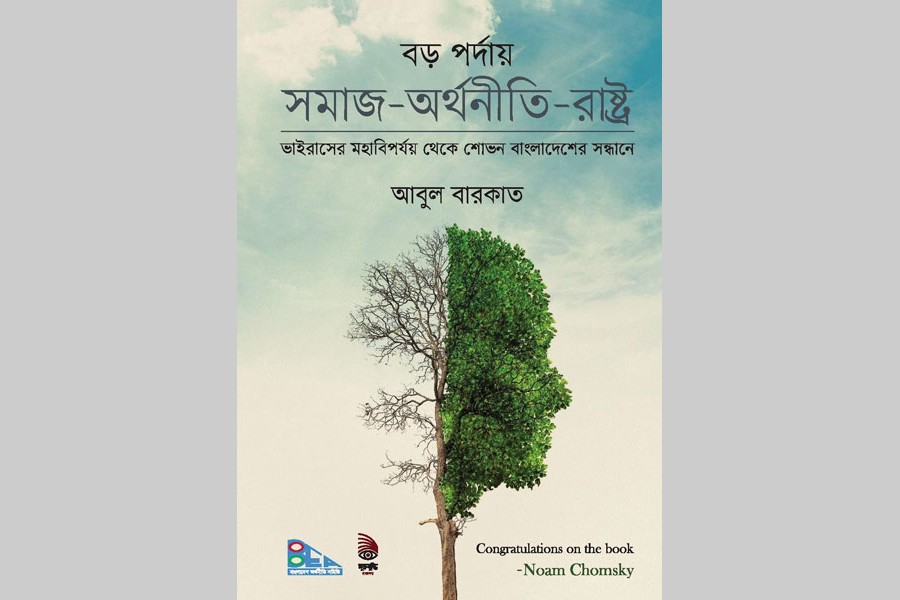The outbreak of coronavirus has led many thinkers across the world to delve deep into the multi-faceted crisis facing the world and humanity today. Some of them have come-up with renewed, if not fresh, thoughts and ideas to shape the future of human society and civilisation. Prof Abul Barkat's book Boro Prodaye Somaj-Orthoniti-Rastro: Vairuser Mohabiporjoye Thekey Shovon Bangladehser Sondhane (On the Larger Canvas of Society-Economy-State: In Search of a Transition from the Virus-Driven Great Disaster to a Decent Bangladesh).
Prof. Barkat argues that the Covid-19 pandemic is nature's wakeup call for a complacent civilisation. He was of the view that the pandemic has its good and bad sides. Its good side is that "we are learning what coronavirus is for us and everybody in the world. I do not want to get into the politics of coronavirus, but this is truly nature's wakeup call for a complacent civilisation." He also showed that in Bangladesh, before lockdown the total household income of middle class was 58.07 per cent but after lockdown it came down to 47.79 per cent. At the same time, household income of the rich increased to 46.09 per cent which was 38.09 per cent in pre-lockdown period. Consequently, inequalities in wealth, health and education have been rising day by day while the informal sector has become seriously affected. Barkat divides the sector in different categories like hawker economy, vendor economy, tokai economy, tea-stall economy, hotel-restaurant economy, driver economy, china town economy, Bongobazar economy, super-market economy, Sim economy and bag economy etc.
Referring to the book of Jareo Diamond (1997), 'Guns, Germs and Steel: The Fates of Human Society' the author mentions, apart from the overuse of fossil fuel there are four causes for mass extinction of this earth. These are: (1) Artificial intelligence, self-programmed robot, chemical arms; (2) Poverty, disparity, inequality; (3) Climate change; and (4) War, bioterrorism, biopiracy. Covid-19 has added a new critical dimension to these.
Against the backdrop, the author proposes a general theory of decent society based on three foundational components. Social component that includes knowledge, free-thinking and creativity promotion; solidarity and secularism; free from all forms of superstitions; rational humans; and welfare science. Economic foundational component includes people's ownership on natural resources, social ownership on production, rigid market-less system. Political foundational component includes democracy, lord less state system, social justice, community administration and people's responsibility to protect motherland. The fundamental objectives of the theory of decent society are accelerating the process of human enlightenment, creativity promoting knowledge system, instilling high sense of solidarity, enlivening the process of human rationality, making people free from all forms of inequality, ensuring full ownership of people in civic governance. The author also elaborates on combating the challenge of Bangladesh from covid-19 impacts. He stressed on development-welfare-progression with nature-environment oriented development. He argues that though we need economic growth, we don't need environmentally harmful, socially unjust, human resources destructive growth. Thus, growth should reduce inequality and must creation job.
According to the author, increase in per capita income or growth of gross domestic product (GDP) is not development. It must ensure healthy life of women-children-old-marginal-poor-deprived-isolated people. He also stresses on transformation of the power of youth to real resources. He argues that people's ownership on natural resources (land, water body, forest, space resources, coal, gas and mineral), upholding human security and equal opportunity for state-society-economy' development are two important principles for decent Bangladesh.
In the book, Barkat strongly argues that fundamentalism is an obstacle to the emergence of decent Bangladesh. He, however, explains that there is a nexus between fundamentalism (external and internal facts) and imperialism as American hegemony is prevailing everywhere.
The book also discusses the economic and social development philosophy of Bangabandhu Sheikh Mujibur Rahman. He developed a model to analyse a set of possibilities on financial and social advancement of Bangladesh. His model estimates that had the father of the nation Bangabandhu Sheikh Mujibur Rahman been alive and his development philosophy implemented, the country's GDP size would have reached at US$421.58 billion before 2011 with annual growth of 9.0 per cent or above.
As for the recovery model from Covid-19, he mentions that 'six diseases' have to be treated in this regard: (1) Class structure induced diseases; (2) food shortage induced diseases; (3) inequality induced diseases; (4) mental depression and fear induced diseases; (5) violence induced diseases; and (6) unemployment induced diseases.
One of the strengths of the book is the author's deep analysis of the country's health sector. Barkat argues that the government must invest in people's health not as a social sector investment but an investment towards accelerated economic development and poverty eradication.
The voluminous work clearly reflects Abul Barkat's long-time devotion to people, country and the planet. It represents inclusive thoughts to change the future of Bangladesh where he wants to see `nature-oriented economy and rent-seeking free economy.'
Shishir Reza is an environmental analyst and associate member, Bangladesh Economic Association.
[email protected]
Matiur Rahman is research consultant, Human Development Research Centre (HDRC)


